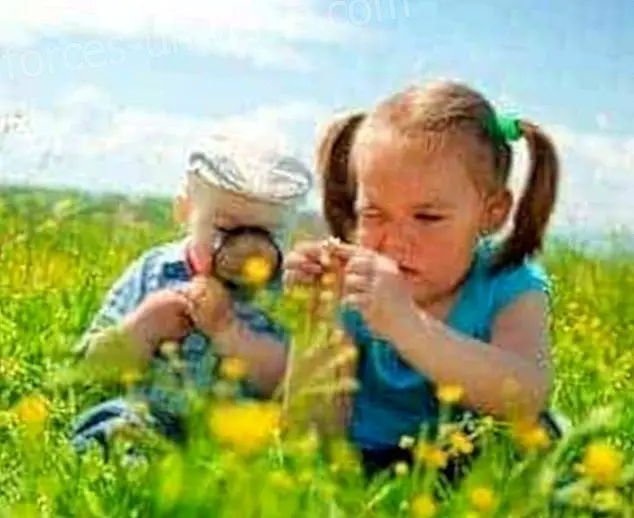 A few years ago, Carl Honoré was discovered about to buy the collection Tales to sleep in a minute, suitable to meet the routine of night reading to their children. He realized, then, that he did not like the time trial race in which his life had been transformed and wrote, for him and for all, Praise of Slowness (RBA), a book that became a success.
A few years ago, Carl Honoré was discovered about to buy the collection Tales to sleep in a minute, suitable to meet the routine of night reading to their children. He realized, then, that he did not like the time trial race in which his life had been transformed and wrote, for him and for all, Praise of Slowness (RBA), a book that became a success.
Not long ago, following a comment from a teacher of his son, he realized that he was in a sad state of becoming one of those anxious and insecure parents obsessed with making his offspring the best painter in the universe. Under his reflections and investigations, Under Pressure (RBA) emerged, a plea for common sense when educating children.
- Your book is not a manual for parents, but a complaint of the overstimulation to which children are subjected today.
- Yes. Adults kidnap children never seen throughout history and, from the instinct of trying to do our best for our children, we have fallen into excess, which causes a negative, tragicomic effect. Because even wanting the best, the way we educate our children causes them mental health problems, physical ...
- Perhaps what is tried is to prepare them in the best possible way so that they can survive in a very competitive society.
-We transfer our work philosophy to our children. How do I do something to improve something, in this case our children? We apply the culture of perfectionism, which has to do with that of consumption, which sells us the idea that everything has to be perfect, the house, the body, the holidays, our children ... The managemet culture infects our whole life, and everything ends up reduced to objectives and goals. We are afraid, but we are not able to realize that uncertainties and doubts are basic ingredients of the task of educating children.
- It also happens that parents project their own frustrations on their children.

–Many parents live through their children. His successes are ours and his failures too. We are too involved in the lives of our children. In a way, boys have become my own self, a vanity project. The line between parents and children is deleted, the family is democratized, and that is very good but, at the same time, the line that divides the role of each one disappears. When that happens, something as important as discipline, rules, knowing how to say "no", we throw it out the window. Children need limits to feel safe and also to function in society and to interact with others.
- It may be that parents care about their children instead of looking after them.
-This is my thesis. The children are not with the parents. Parents despise the small, the simple, the cheap, and the children what they need most is our presence, attention, that we are. This is an easy line to cross. The greatest expression of love towards our children is being with them. When paternity ends up being a cross between the development of a product, a work project, and the sport of competition we all suffer, parents and children, because we are denying the main pleasures, such as sharing, being, laughing ...
-Meet?
-Yes, meet. Fatherhood is a journey towards discovery and like all trips it involves uncertainties, doubts, errors. People who accept that transforms fatherhood and motherhood into a very rich adventure, much more interesting than making a product. The result then is more complete and healthier children.
- Teachers complain that they cannot with children because they arrive overprotected from home.
- Not only that. Children do not accept the rules but neither do the criticisms. We are in a very broad cultural change, which is that of the culture of never aging, the glorification of youth, of peterpanism . It is good to get out of that idea that the mere fact of being parents limits our lives, but we forget or throw through the window that parents and children have different roles. Teachers are in a kind of dead end. Children do not know how to behave and parents do not know what they want, they are always worried. We have many signs that we have lost the compass and control in the upbringing of our children. I see it in the social environment of London . Parents are always watching the school with a magnifying glass, pending the teacher's mistake. They are always like helicopters flying over the school, and that hurts the kids, hurts and worries them. They are afraid, for example, of having their father look at their homework. The effort to give them the best, make them the best, is logical, but we are denying them something very important, and they learn to get rid of complex and difficult situations, in which they are not n the best. With our attitude we prevent them from learning to function well in life.
- Did you teach it?
-I had a pretty good education in Canada, and although I also found myself immersed in some situation that I didn't like, my parents didn't intervene, they let me shake. In the last years of high school I had a Biology teacher that I hated, but I had to continue studying the subject to finish high school. From that experience I learned many things, including getting along with someone I didn't like. If we always give our children the perfect circumstances, we don't prepare them for the real world.
-Do we worry too much about the academic and sports training of our children and forget about the emotional?
It is that the academic and sports is easier and the balance is more visible. Empathy, generosity, solidarity cannot put them in a curriculum. Educating in those values is more difficult and expensive. One of the results of becoming obsessed with the hyperactivity of children is that it reinforces selfishness and sees the other as a rival, as someone who can take his place in the university, in the football team. We are creating selfish consumers and we must change that. The market asks for creative people, who know how to work in a team and we are educating kids who don't know how to do that. The future is in creativity and neither our school system nor our society forms them for it, on the contrary. They are kids who always have the right answer, they don't know how to create, they just learn the recipe we taught them. You have to throw away the recipe and give them space to be creative.
-Parents do not set limits but we look for super nanis ”to put them for us or teach us to put them. Are we afraid to face our children?
-We have reached the point of hiring paternity consultants. We return to fear, which is at the root of this cultural moment. We have lost confidence in being parents. When the children are born we have already read 50 books about fatherhood, we have gone to classes, we have soaked articles about it. This bombardment of advice, sometimes contradictory, makes our trust much more vulnerable. It is assumed that the goal of this entire industry is to give more confidence, but paradoxically we have lost the ability to seek the inner voice that we all carry inside. We know our children better than anyone, however we educate them as if we needed to read an instruction manual or look at what the neighbor does. We get carried away by the current of panic and lose that inner voice. I wrote the book to regain confidence in myself as a father.
- Have you recovered it?
- Yes.
- Has your relationship with your two children improved?
- Yes. I feel more relaxed with them, I'm not in such a hurry. I am not always attentive, I leave more to your air and the truth is that they have passion for what they do. My daughter, for example, dances flamenco. He loves and enjoys.
- Do you also do extra school activities?
- Yes, but the ones they like. Children often do the extracurricular activities that their parents want or, in the case of teenagers, to put together an impeccable curriculum.
- Are children happier now than before?
- It's very difficult to answer that. There are many indications that no, and that is seen in the increase in psychological problems and the huge number of boys who receive medications to control their mood. That is a very bad sign. There is great false happiness, both among adults and among children, which is a product of consumerism. We bought a new ipod or the latest Prada mini skirt to be happy, but does that generate happiness? No. It is an artificial happiness, shallow, not lasting. I hope that the financial crisis will help us to restore this materialism without limits to which we have arrived and make us reflect. We despise the simple, the comfortable, the simple, that stick with which our son can play for hours. We feel bad if our son does not have an electronic toy of 85 euros, not only because he has the neighbor's son, but because in the box he tells us that it is very useful for his greater cognitive development. The market manipulates our fears, our anxieties to sell more and more. What will happen now when people stop having so much money? With a little luck we will recover the stick and realize that it does have an effect on the child's cognitive development.
- Between that excessive attitude and the passing of the children, doing nothing, where is the intermediate point?
-This question is incontestable. The equilibrium point is different in each case. There is no perfect attitude. Now we are in excess and what it is about is to move the pendulum towards equilibrium. I cannot tell people what they have to do, but I can write down the indications they indicate when they are not in the right direction. When children do not talk about extracurricular activities, when they have dark circles, health problems, they sleep poorly, or they sleep in the car between activity and activity, something is wrong. You have to put limits on social pressure and try to locate each person's personal compass so that your child does what is best for him and not the neighbor or your office partner. We must apply common sense.
- That common sense is not always found.
- Being a father is difficult, hard and overwhelming. It is not a dream vacation. The problem is that instead of thinking and accepting that everything will work out, we invest in the wrong place.
It may interest you: Let's recover our voice and inner light when we are parents
Source: La Vanguardia
Source: https://cambiemoslaeducacion.wordpress.com
Carl Honoré: "Limits are necessary because they give security to the child"






